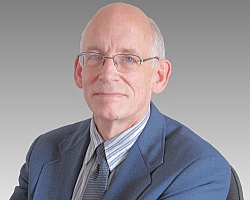|
George Ainslie Clinical Professor of Psychiatry Personal web site: http://picoeconomics.org/ |
Education: Medical Doctor (MD) at Harvard University School of Medicine.
Research interests: Intertemporal choice and hyperbolic discounting; Self-control, impulsiveness and impulse control; Addiction; Willpower, rationality and motivational states; Behaviorism, Behavioral economics, Neuroscience.
Web resources on Professor Ainslie: George Ainslie at Wikipedia (http://en.wikipedia.org/wiki/George_Ainslie_(psychologist))
SOME PUBLICATIONS AVAILABLE ON THE WEB
(most available at Professor Ainslie's web site: http://www.picoeconomics.org)
(2005) G. Ainslie, Précis of breakdown of will, Behavioral and Brain Sciences, 2005, 28, 635-673 (http://picoeconomics.org/aBreakdown_Will.pdf)
(2003) G. Ainslie, J.R. Monterosso, Building blocks of self-control: Increased tolerance for delay with bundled rewards, Journal of the Experimental Analysis of Behavior 79, 27-48, 2003 ( http://seab.envmed.rochester.edu/jeab/articles/2003/jeab-79-01-0037.pdf)
(2001) G. Ainslie, Breakdown of will, Cambridge University Press, 2001 (http://books.google.it - type: "Breakdown of will") (1999)
(1999) G. Ainslie, The dangers of willpower: A picoeconomic understanding of addiction and dissociation. In J. Elster and O-J. Skog, (eds.), Getting Hooked: Rationality and Addiction Cambridge University Press, pp. 65-92, 1999 (http://picoeconomics.org/Articles/DangerWill99.pdf)
(1996) G. Ainslie, Studying self-regulation the hard way, Psychological Inquiry 7, 16-21, 1996 (http://picoeconomics.org/Articles/BaumeistSelf-Cont96.pdf)
(1995) G. Ainslie, A utility-maximizing mechanism for vicarious reward: Comments on Julian Simons "Interpersonal allocation continuous with intertemporal allocation", Rationality and Society 7, 393-403, 1995 (http://picoeconomics.org/Articles/SimonVicarious95.pdf)
(1991) G. Ainslie, Intertemporal choice. Derivation of "rational" economic behavior from hyperbolic discount curves, American Economic Review 81, 334-340, 1991 (http://www.picoeconomics.org/Articles/AmEconRev91.pdf)
(1989) G. Ainslie, Freud and Picoeconomics, Behaviorism 17, 11-19, 1989 (http://www.picoeconomics.org/Articles/FreudPico89.pdf)
(1986) G. Ainslie, Beyond microeconomics: conflict among interest in a multiple self as a determinant of value. In J. Elster (ed.), The Multiple Self, Cambridge University Press, pp. 133-175, 1986 (http://www.picoeconomics.org/Articles/BeyondMicro86.pdf)
(1982) G. Ainslie, A behavioral economic approach to the defense mechanisms: Freud's energy theory revisited, Social Science Information 21, 735-779, 1982 (http://www.picoeconomics.org/Articles/BehavEconFreud82.pdf)
(1975) G. Ainslie, Specious reward: A behavioral theory of impulsiveness and impulse control. Psychological Bulletin 82, 463-496, 197 (http://www.picoeconomics.org/Articles/SpeciousReward75Reduc.pdf)
Working papers and drafts:
(2009) A. Hofmeyr, G. Ainslie, R. Charlton, D. Ross, The relationship between addiction and reward bundling: An experiment comparing smokers and non-smokers ( http://www.commerce.uct.ac.za/economics/seminars/2009/20090914%20Hofmeyr%20The%20relationship%20between%20addiction%20and%20reward%20bundling.pdf)
(2007) J. Monterosso, G. Ainslie, The behavioral economics of will in recovery from addiction. Published in final edited form as: Drug Alcohol Depend. 2007 September ; 90 Suppl. 1 ( http://www.ncbi.nlm.nih.gov/pmc/articles/PMC2756459/pdf/nihms27070.pdf)
(2005) G. Ainslie, Emotion as a motivated behaviour (http://picoeconomics.org/Articles/HatfieldAI1051.pdf)
(2003) G. Ainslie, A selectionist model of the Ego: Implications for Self-Control, Presented at Disorders of Volition, a conference of The Max Planck Institute for Psychological Research Irsee, Germany, December 13, 2003 (http://picoeconomics.org/Articles/MunichRepr.pdf)
(2003) G. Ainslie, Uncertainty as wealth. Published in: Behavioural Processes, 64, 369-385, 2003 (http://www.picoeconomics.org/Articles/Uncertainty.pdf)
(2002) G. Ainslie,The effect of hyperbolic discounting on personal choices, Keynote speech to the thematic session, "Personal Choice and Change", Annual convention of the American Psychological Association, Chicago, 2002 (http://picoeconomics.org/Articles/APA.pdf)
(2002) G. Ainslie, J. Monterosso,Hyperbolic discounting as a factor in addiction: A critical analysis. Pubblicato in Rudy Vuchinich and Nick Heather, eds., Choice, Behavioural Economics and Addiction, Pergamon, 2003 (http://picoeconomics.org/Articles/Aladdix.pdf)
(2002) J. Monterosso, G. Ainslie, P. Toppi Mullen, B. Gault, The fragility of cooperation: A false feedback study of a sequential iterated prisoner's dilemma, Finald Draft. Published in: Journal of Economic Psychology 23, 437-448, 2002 (http://picoeconomics.org/Articles/barg%20final.pdf)
Updated: January 11, 2010

